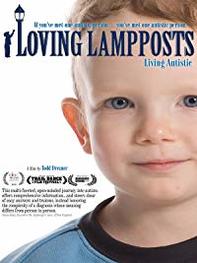 Loving Lampposts is a thoughtful and intelligent documentary by Todd Drezner about autism, neurodiversity, society’s viewpoint of the diagnosis and how that impacts the way we treat autistic individuals, both medically and personally. I was excited to see that this balanced and open minded film is available on Netflix instant watch. Drezner’s son Sam, was diagnosed with PDD-NOS as a toddler. He seems to be an easy-going child, although quirky and not very social. (I won’t say “high functioning”, because the film offers a thought provoking conversation on that term.) The film’s title comes from Sam’s early special interest in and connection to a group of lampposts near his home. Visiting the lampposts is an important ritual for Sam as a child. But the film is much more than a look at one family’s experience with their special needs child. Drenzer thoughtfully examines the big questions about whether autism is an illness to be cured or a difference to be accepted. In his interview with Steve Silberman of the blog Neurotribes, Drenzer discusses how he views autism as a difference as well as a disability. I appreciate this realistic and still respectful stance. In the documentary, Drenzer manages to interview many of the big names in autism science, such as Simon Baron-Cohen, and Paul Offit. He talks to parents of autistic children, like AutismVox blogger Christina Chew, and author Roy Grinker, and autism Playboy Bunny Jenny McCarthy. The most exciting group in the film is the widely diverse group of autistic adults represented. So often the focus of research, treatment and policy is on children, leaving autistic adults as the forgotten majority. Drenzer talks to artist Dora Raymaker of AASPIRE, Sharisa Joy Kochmeister of AutCom, author Stephen Shore, as well as others. The film celebrate the gifts these individuals bring, while not ignoring their difficulties. Loving Lampposts is entertaining and informative, well worth watching. 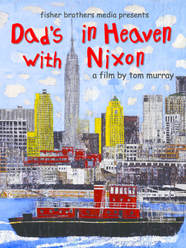 Perhaps because the visual world is so intense for many autistic individuals, there are a number of excellent autistic artists. I recently blogged about artist Ping Lian Yeak, a young autistic man who displays his artwork in shows around the world. Chris Murray, the subject of the documentary Dad’s In Heaven with Nixon is another successful autistic artist. Murray, who lives independently and has worked in several jobs for a number of years, could easily support himself through his art, but has chosen to keep it as a side project. I recently purchased Murray’s poster “Red Brick” for my office. While every artist is different, I think this work really highlights some of the strengths of autism. While the work is a cohesive whole, the details are more compelling than is often the case in more neurotypical work. Murray painstakingly represents each window, brick and taxicab. But the details don’t overwhelm, because the rhythm of the piece is so apparent. The detail I enjoy the most is that the artist isn’t constrained by taking just one point of view. Each aspect is represented from its most interesting viewpoint. The building is seen head on, the taxis driving away have a regular top down spacing, and those passing in front of the building are seen from the side. Somehow, although this is different than what we’re used to seeing in a representational painting, it works, maybe because it captures the details much the way we would notice them individually. The tension between whimsy and structure makes this a much more sophistocated work than it might appear to be at first. You can learn about the excellent documentary, and see some examples of Chris Murray’s work on the Dad's In Heaven with Nixon Movie website. Autism brings special talents as well as difficulties, and one area where this is especially evident is in the realm of art. I’m in the process of moving my office this month, and while decorating, I found a number of examples of excellent art created by autistic individuals.
One such talented artist is Ping Lian Yeak, a 17 year old boy, born in Malaysia and now living in Australia. Ping Lian began an art based program as part of a behavioral plan, to encourage him to learn fine motor skills. After a while, rote tracing was replaced by drawing his own works. For the last several years, Ping Lian has been featured in a number of television programs, and he has displayed his work in galleries around the world. A visit to Ping Lian Yeak's website shows just how appealing the artwork is. A focus on details is balanced by strong compositional elements. With a quirky sense of perspective and bright, lively colors, the work is energetic and alive. There are many examples displayed online, and a full array of prints for sale. I had a hard time limiting myself to a few. 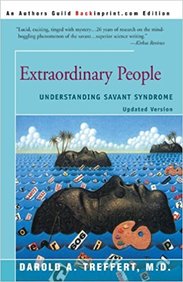 A new documentary series, Ingenious Minds, from the producers of Hoarders, premiered this month on Thursdays on the Science Channel. As described on the website, “Enter the lives of savants: individuals who possess an extraordinary ability in areas such as art, music and mathematics, while also suffering from intellectual and developmental disabilities.” The series draws heavily on the expertise of Psychiatrist Darold Treffert, an expert on Savant Syndrome and author of several books on the topic. Savant Syndrome, according to Treffert’s reporting, occurs in as many as 10 percent of autistic individuals, as well as others with differing diagnoses. One early episode of the show features John Elder Robison, author of Look Me in The Eye, which I reviewed in an earlier post. Another episode is about an autistic young man who is also a world ranked pinball player. Temple Grandin will be featured in an upcoming episode. 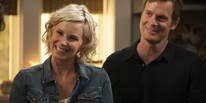 I'm never quite up to date on TV viewing, since I watch everything off my DVR, so I'm commenting about a show from a few weeks ago. Parenthood, Season 2, Episode 4, which features a family dealing with a child's Asperger's, talked about the dreaded divorce statistic "80% of families with an autistic kid get divorced." Fortunately, that's just not true. The 80% statistic is an enduring myth I see quoted frequently, but studies just don't back it up. The divorce rate seems to be about the same, whether a child is autistic or not. Even worse, the show quoted that the character's therapist told her that it was true. Lesson 1: Don't believe everything your therapist tells you! Lesson 2: Just because your child is autistic, doesn't mean you're doomed to divorce. You can read an earlier discussion of this topic on my Divorce and Autismpost. Please don't skip the show because of one bad statistic. Autistic kids are varied, and every family is different, but in general, Parenthood seems to do a pretty good job of presenting the joys and struggles of raising an autistic child. Dad’s in Heaven With Nixon is a touching film about a close, multigenerational family and their struggles with mental illness, alcoholism, and autism. In spite of all these difficulties, the family’s bond shines through the film. The real beauty of this documentary is the loving relationships it shows between Christopher, a gifted and successful artist with autism, his aging mother, and his brother and the film’s creator, Tom Murray. Christopher, born in 1960, suffered oxygen deprivation at birth and was later diagnosed with autism. Certainly, the 1960s and 1970s were not a time of great information about helping those with autism, and Christopher underwent a number of therapies. His mother talks about how she was uncertain of how these therapies were working, but that she did determine that loving her son would help him, and how she and all the siblings worked together to encourage his development. In seeing the now adult Christopher it’s apparent how successful she was in her efforts. Christopher Murray is a charming and capable adult, living on his own and successfully holding two jobs as well as succeeding as an artist. He seems to have continued with his loving relationship with both his mother and his older brother. 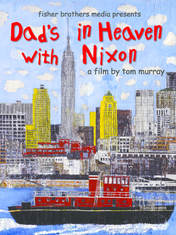 The alternate story woven through the film is of the Murray’s father and grandfather. Through old films and family pictures, Tom Murray narrates the story of the men’s difficult lives, including chronic drinking, mood swings, financial difficulties and probable depression and bipolar disorder. It’s an intriguing juxtaposition with the story of autism in comparison. So often, parents despair of an autism diagnosis, and it’s refreshing to see a representation of a happy and successful adult on the spectrum, and how he contributes so positively to his family. The film is presented regularly on Showtime. You can get more info, and view Chris Murray’s artwork on the film’s website. How do you learn best? When working with clients, I find most of my clients are visual learners. That means supplementing our discussions with sketches and graphs and pictures can make things much clearer. Other people learn best experientially, in which case we might act things out and role play. A lot of people, myself included, love to learn by reading. Many people, when first diagnosed, or when trying to understand a new phase in their lives, turn to book for ideas and answers. For you readers, I’ve got lots of book reviews on this blog. Then there are those individuals who are auditory processors. A lecture, a recording, a conference may be the best way for auditory processors to take in new material. 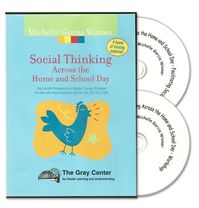 The four hour DVD set from Michelle Garcia Winner, Social Thinking Across the Home and School Day is an excellent resource for those who want something different than a book. The first two hours are a filmed lecture from Michelle Garcia Winner, where she presents her ideas in her typical clear, detailed, and easy to understand manner. The material is quite similar to what she presents in her books, but if you’d rather have the ideas clearly explained, this is a great resource. The second two hours demonstrates Garcia Winner with school age students, individually and in groups. Although Garcia Winner is demonstrating her social skills groups, the techniques and ideas can be useful to parents hoping to work with their children, as well as individuals trying to pick up these skills themselves. Often, people find that it can be tough to go from the theory about an idea to the application, and demonstrations like these may be just what it take to make these ideas clear. These DVDs are designed for the parents of children on the spectrum, as well as teachers and professionals. Garcia Winner talks extensively about her communication model, as well as how a diagnosis such as Asperger’s or autism can impact learning as well as social relations. But there’s so little out there for adults on the spectrum, this material could be useful for adults as well. You can find the DVDs, as well as other materials on Michelle Garcia Winner’s Social Thinking website. What will happen to all the autistic children when they grow up? Who’s going to care for them, employ them, love them? What about when their parents can’t be there to manage things? These are a few of the tough questions that are explored in the haunting 2006 film, Today’s Man, by Lizzie Gottlieb, which chronicles six years in the life of her brother Nicky, diagnosed at the age of 21 with Asperger’s.
Adults with Asperger’s often struggle with a world where they don’t quite fit in. They’re often bright and talented, but chronically underemployed. Frequently they long for connection, but too often they can’t find a social circle of their own, and spend time alone or only with family. Many Asperger’s adults long to date, but can’t find a romantic partner. Nicky Gottlieb, now in his late 20s, deals with all of these issues in this film. Until he was an adult, his Asperger’s was undiagnosed, but his family knew he was always different. He had extraordinary abilities, such as unusual math and language skills, but almost no ability to read social cues or manage the responsibilities of daily living. The film features Nicky’s New York family of loving, quirky intellectuals, including his sister Lizzie, the film’s producer. Nicky’s attempts to find employment are documented, showing his difficulty in coping with the boredom and rules of his job. We also follow Nicky to a support group session, featuring some of the familiar faces from GRASP. The film is tough because, as in life, there are no easy answers, and the story doesn’t wrap up neatly. I found myself searching online for the next chapter of his story, but couldn’t find much of an update. The genuine love and caring of this family shine through the film, and Nicky’s spirit inspires, so this is a film that you’ll remember long after the viewing is over. Last night’s Emmys awarded the television movie ‘Temple Grandin’ the win for Outstanding Made for Television Movie, as well as the award for Outstanding Lead Actress in a Miniseries or a Movie to Claire Danes for her highly accurate portrayal of Grandin. I talked about this film in an earlier post, and it’s certainly worth watching if you haven’t seen it yet. Grandin was interviewed on the red carpet, dressed in her traditional western wear, rather than the typical Hollywood gown. She talked about her hopes in making the film. (I apologize for any transcription errors.) 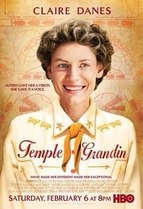 “The other thing I hope this movie's going to do is educate people about autism...it's very accurate, my visual thinking,... sound sensitivity, touch sensitivity, visual sensitivity, anxiety, and also to show that people with autism really can do things and they can really succeed.… motivating some of these young people, that they can get out and they can do things.” Grandin was articulate and well spoken in her own quirky way, and, as always, inspiring about what all individuals can accomplish. The film highlights both the difficulties Grandin had growing up, as well as how her autistic traits were those very strengths that allow her to succeed. Grandin's mother, whom she acknowledged during the ceremony, is portrayed as truly supportive and one of the reasons that Grandin is so successful. 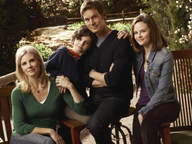 The NBC show Parenthood has brought increasing attention to the diagnosis of Asperger’s, with one of the show’s characters, Max Braverman, newly diagnosed with Asperger’s. With a large, multigenerational cast about many family members, Asperger’s is not the focus of the show, but just one storyline. I like that aspect, because it’s so realistic; the family copes with Asperger’s, its treatment, symptoms and behaviors, but life doesn’t stop. Work continues, other family members have their own needs, the parents have a relationship that includes dealing Asperger’s, but other aspects as well. One recent episode, Team Braverman, focused on the family’s participation in an autism fundraiser. An interesting aspect was that the episode raised the question of when to tell a child about his own diagnosis, something which clients ask me frequently. In the show, Max’s parents asked their vaguely defined diagnosing professional, Dr Pelikan, about what to tell their son. His advice was that there is no one answer, but it was important not to “burden him with information he’s not going to be able to process.” and “when it’s time to talk to him about it, you’re going to know: Max is going to tell you.” The parents later state that this advice is not very helpful, and not very comforting. At the end of the episode, Max asks what I view as the perfect opening question for a discussion of his diagnosis: “Why we did we give the money (we raised) to autism? There are lots of other charities.” Dad Adam looks thoughtful, but passes on the opportunity to have a meaningful discussion about his son’s diagnosis, instead commenting on the trophy. I agree that children need an age appropriate explanation, but in my experience, kids never seem to find this information a “burden”, instead it’s typically a relief, because they’re aware that their behavior and relationships aren’t like those of other kids. I also agree that kids ask questions when they want to have more information, but they may be subtle questions. Just like with other difficult discussions, parents, like Adam Braverman, can easily miss the cues if they’re not comfortable having the discussion. Shows like Parenthood can be so valuable because they allow parents a bit of practice time to think about these issues before confronting them in their own families. If you missed it, Team Braverman, season 1, episode 12, which aired May 18, 2010, is available online. |
Patricia Robinson MFT
I'm a licensed therapist in Danville, California and a coach for Asperger's and ADHD nationwide. I work with individuals of all ages who have special needs, like Autism Spectrum Disorders, ADD, ADHD, and the family members and partners of special needs individuals. Archives
February 2015
Categories
All
|

 RSS Feed
RSS Feed